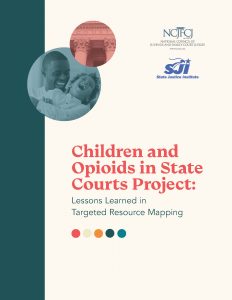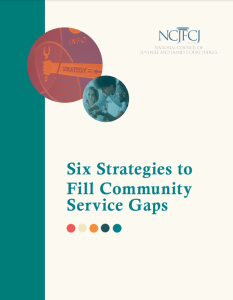Introduction
The National Council of Juvenile and Family Court Judges (NCJFCJ) with support from the State Justice Institute (SJI) developed the Target Resource Mapping Toolkit and hosted a series of five webinars titled Opioids and the Courts- Difficult Conversations. NCJFCJ developed the Toolkit to assist courts in identifying the resources in their community. NCJFCJ and expert faculty explored challenges associated with referring children and families to services in dependency and delinquency cases. The faculty and webinar attendees had the opportunity to discuss how courts and services providers can work together to meet the needs of families and improve their lives. Each particular topic area as well as information on the faculty are listed below.
Targeted Resource Mapping – Toolkit, Lessons Learned, and Strategies to Fill the Gaps
The NCJFCJ partnered with judicially-led court sites to engage in Targeted Resource Mapping to document the continuum of services available for children and families affected by OUDs and other SUDs. As a result of that work, the NCJFCJ developed the Targeted Resource Mapping Toolkit (Mapping Toolkit). The Mapping Toolkit includes templates to develop a Targeted Resource Map (resource map), Targeted Resource Directory (resource directory), Targeted Resource Mapping Action Plan (action plan), and Lessons Learned in Targeted Resource Mapping.
After completing the Targeted Resource Mapping process with multiple court sites, NCJFCJ identified a need to fill gaps in the continuum of care for substance use disorders. With funding from the Office of Juvenile Justice and Delinquency Prevention, the NCJFCJ developed the guide, Six Strategies to Fill Community Service Gaps.
- Funded by the OJJDP
Opioids and the Courts Webinar Series
Topic 1: Difficult Conversations Around Prevention
December 16, 2020
- Hon. Terre Fratesi, Shelby County Juvenile Court
- Erica Glynn, Shelby County Department of Children’s Services Community Advisory Board
- Chanda Dunn, LCSW, Clinical Social Worker, University of Tennessee Heath Science Center, Center for Developmental Disabilities
- Dr. Bernard Williams, Chief Probation Officer at Juvenile Court of Memphis & Shelby County
Resources:
- U.S. Department of Health & Human Services: Office of the Assistant Secretary for Planning and Evaluation – Child Welfare and Substance Use
- National Center on Substance Abuse and Child Welfare: Children and Families Affected by Parental Substance Use Disorders (SUDs)
Topic 2: Difficult Conversations Around Intervention and Treatment
January 20, 2021
- Hon. Kathy Delgado, Colorado District Court Judge
- Katherine Gregg, Assistant County Attorney, Adams County Attorney’s Office
- Wendy Lewis, Respondent Parent Counsel
Resources
- NCJFCJ Policy Infographic
- NCJFCJ Resolution: Access to Medication-Assisted Treatment for Adolescents and Adults in the Juvenile and Family Justice System
- SAMHSA MAT
- Family First Title IV-E Clearinghouse
Topic 3: Difficult Conversations around Harm Reduction
February 17, 2021
- Hon. Kim McGinnis, Ph.D., Chief Judge, Pueblo of Pojoaque Tribal Court
- Jill Campoli, LPCC, CCTP
- Dawn DeSmet, M.S.
Resources
- National Harm Reduction Coalition (NHRC) Website
- NHRC Principles of Harm Reduction
- SAMHSA Harm Reduction Coalition (HRC) Advocates for Behavioral Health
- Minimizing Harm: Public Health and Justice System Responses to Drug Use and the Opioid Crisis
Topic 4: Difficult Conversations around Preventing Overdose and Death
March 17, 2021
- Hon. Felice Kerr, Family Court State of Delaware
- Ann Pedrick, Delaware Child Death Review Commission
- Bridget Buckaloo, Delaware Perinatal Cooperative
Resources
- Overdose Prevention – Harm Reduction
- Evidence-Based Strategies for Preventing Opioid Overdose: What’s Working in the United States
- NCSC Benchcard
Topic 5: Difficult Conversations Around Recovery
April 21, 2021
- Magistrate Sherry Hartzler, Allen County Superior Court – Family Recovery Court
- Maja Grgic, Family Recovery Court Supervisor, Allen County Dept. of Child Services
- Hillary Knipstein, Family Recovery Court Attorney, Allen County Dept. Child Services
Resources
- Family Treatment Courts for Families Affected by Substance Use Disorders in Child Welfare
- SAMHSA’s Working Definition of Recovery
- National Institute on Drug Abuse
- SAMHSA: Recovery and Support: Recovery-oriented care and recovery support systems help people with mental and substance use disorders manage their conditions successfully.



